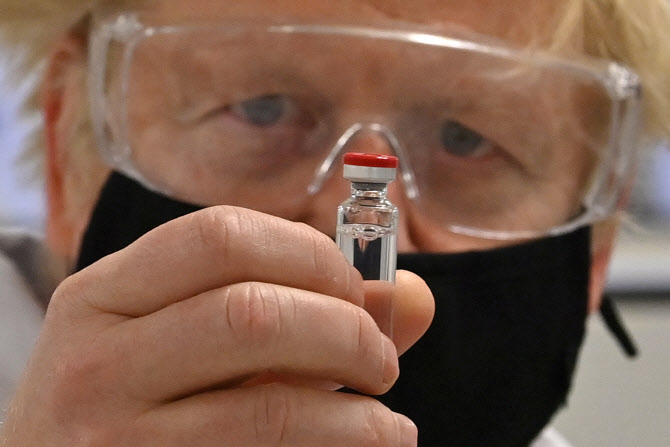|
[이데일리 김보겸 기자] On the 30th (local time), the British government approved the emergency use of the Corona 19 vaccine jointly developed by local pharmaceutical companies AstraZeneca and Oxford University. The background of the controversy over efficacy is drawing attention as the US delays urgent use and the effect exceeds between 60% and 90% depending on the dosage method. It is interpreted as a strategy to secure as many vaccines as possible to inoculate the entire population and maximize the preventive effect.
The UK is the first in the world to approve emergency use of the AstraZeneca vaccine. This is the second approval after Pfizer and Biontech, which started vaccination on the 8th. Initially, it was expected to be approved first, but it was delayed due to controversy that the effect will vary depending on the dosage method. AstraZeneca vaccine gives 90% of the preventive effect if half of the dose is first inoculated and the other half is additionally inoculated one month later, but the effect falls to 62% when the full dose is administered twice. ‘It caused controversy.
It was pointed out as a problem that the average prevention rate was low at 70.4%. It is said that the prevention rate is less than 95% of Pfizer/Bioentech or 94.5% of modders or vaccines. In addition, it was a problem that there were few elderly participants in the existing clinical trials, so the preventive effect on the elderly was not confirmed.
|
The goal is’large-scale vaccination’
Despite such controversy over reliability, the UK’s approval of the AstraZeneca vaccine is interpreted because it is judged that the recent spread of corona in the UK cannot be ignored. “The new vaccination came after the UK Public Health Department said it was facing an unprecedented level of infection,” the BBC said. “The current goal is to protect as many vulnerable groups as possible.” In the UK, more than 50,000 new cases a day come out and the mortality rate is 1066 per 1 million people, ranking 12th in the world. In particular, a variant virus that spreads 70% faster than the existing virus has recently spread rapidly in the UK, accelerating the spread of infection. British Prime Minister Boris Johnson said, “60% of new cases in the UK were infected with the virus strain.”
In this situation, the UK ordered 100 million doses (for 50 million people) of the AstraZeneca vaccine. The decision was based on advice from the London Institute for Hygiene and Tropical Diseases (LSHTM) that 2 million people should be vaccinated every week to prevent the third spread. Health and Welfare Minister Matt Hancock stressed that “we have enough vaccines to be vaccinated by adults across the UK.” The combined 30 million doses (for 15 million people) of the vaccine obtained from Pfizer could be used to inoculate the entire UK adult population of about 66.8 million.
In other words, the British government’s plan is to see the game with quantity rather than quality. “I believe tens of millions of people will be vaccinated by the first quarter of next year,” Pascal Soort, CEO of AstraZeneca, told the Financial Times (FT). By the end of June next year, 40 million people, about 60% of the total population, can get AstraZeneca vaccine, and considering that the average preventive effect is 70%, it is expected that more than 28 million people can get the vaccine prevention effect. .
|
Low price, can be stored at normal refrigeration temperature
Another reason why the AstraZeneca vaccine is suitable for large-scale vaccination. It is inexpensive and easy to store and transport. AstraZeneca vaccine is about 3300 won per dose, which is cheaper than Pfizer’s one dose (about 21500 won) and Modena’s one dose (about 35,000 won to 41,000 won). In addition, compared to Pfizer’s vaccine, which must be stored at around minus 70 degrees Celsius, which is a very low temperature, AstraZeneca vaccine can be stored and transported for at least 6 months even at a normal refrigerator temperature of 2 to 8 degrees Celsius.
The secret to price competitiveness and distribution convenience lies in the vaccine development method. The AstraZeneca vaccine uses a method of inducing an immune response by injecting an inactivated coronavirus into an adenovirus that causes a cold in chimpanzees and then injecting it into the human body. This is an existing traditional vaccine development method, which has high stability and can be stored at general refrigerated temperatures, and the vaccine manufacturing cost is low, making it easy for mass production.
On the other hand, Pfizer and Modena developed a vaccine using’messenger ribonucleic acid (mRNA, messenger RNA)’ that contains the genetic information of the virus. This is the first time that mRNA-based vaccines have been commercialized. Although it is an innovative technology, it is pointed out that no country has ever produced it in large quantities, so it is difficult to predict any side effects in the long run.
The’home-made vaccine premium’ seems to have also worked. The BBC said about the AstraZeneca vaccine, “Unlike (US) Pfizer and (Germany) Bioentech, the confidence in supply is higher as it is made in the UK,” and “Pfizer vaccine must be supplied by sea from Belgium.”
Meanwhile, the European Medicines Agency (EMA) and the US Food and Drug Administration (FDA) say they need more data before approving the use of the AstraZeneca vaccine. The EMA predicted that approval in January would be difficult, saying, “We have not received enough data to grant conditional approval for the AstraZeneca vaccine.” The FDA also predicted that the approval of the AstraZeneca vaccine will be reviewed around April next year because clinical trials are under way.



